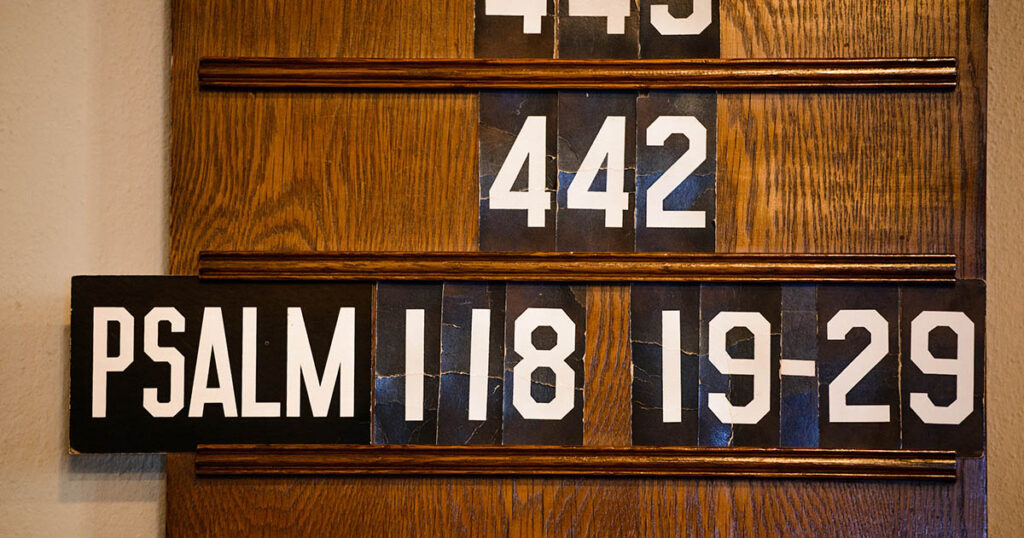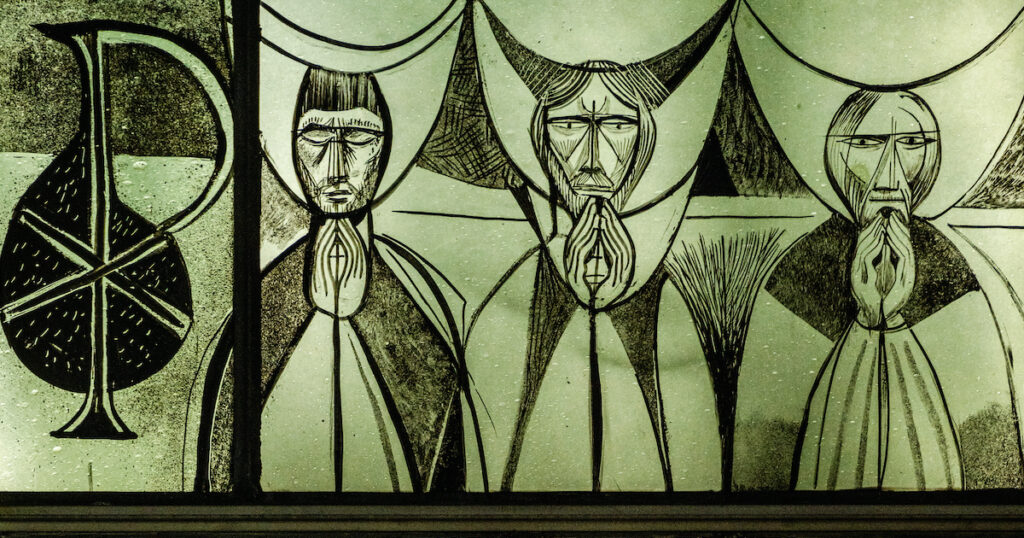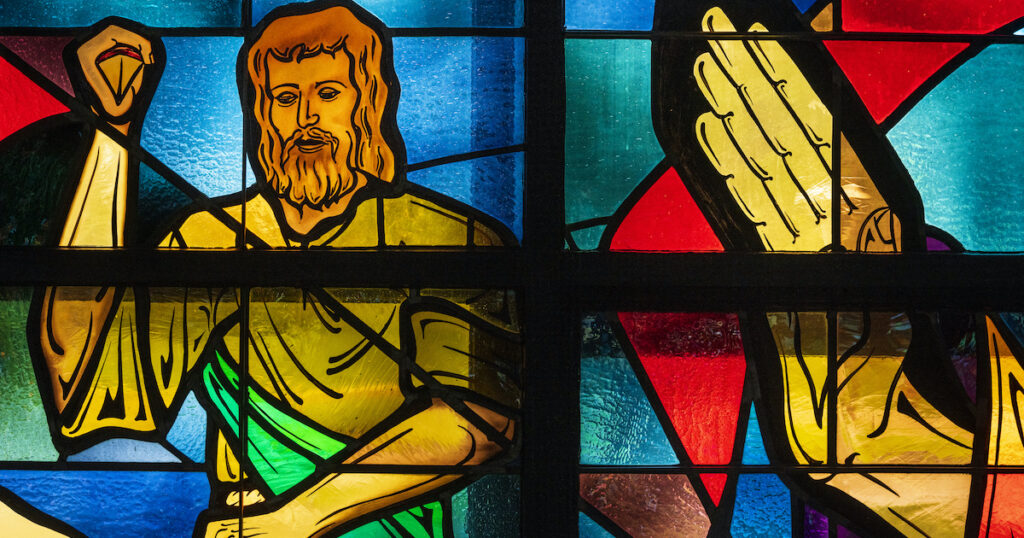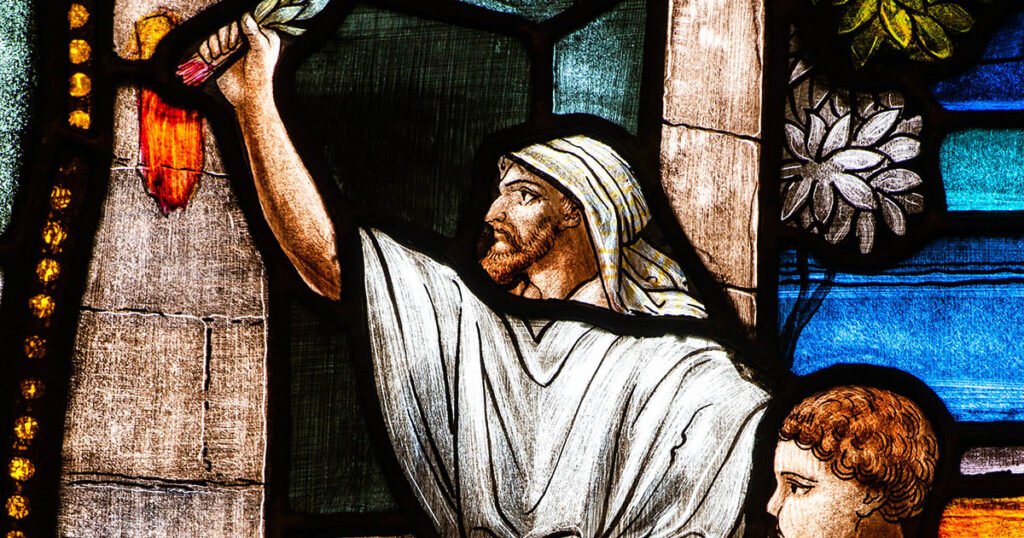O Lord, how many are my foes!
Many are rising against me;
2 many are saying of my soul,
“There is no salvation for him in God.” Selah3 But you, O Lord, are a shield about me,
my glory, and the lifter of my head.
4 I cried aloud to the Lord,
and he answered me from his holy hill. Selah5 I lay down and slept;
I woke again, for the Lord sustained me.
6 I will not be afraid of many thousands of people
who have set themselves against me all around.7 Arise, O Lord!
Save me, O my God!
For you strike all my enemies on the cheek;
you break the teeth of the wicked.8 Salvation belongs to the Lord;
Psalm 3
your blessing be on your people!
Dietrich Bonhoeffer calls the Psalter “the Prayerbook of the Bible.” He beautifully lays out how we may read the Psalms primarily as the prayers of Jesus—only with Jesus does David pray and so it is for us. Bonhoeffer says,
“If Christ takes us along in the prayer which Christ prays, if we are allowed to pray this prayer with Christ, on whose way to God we too are led and by whom we are taught to pray, then we are freed from the torment of being without prayer. Yet that is what Jesus Christ wants; he wants to pray with us. We pray along with Christ’s prayer and therefore may be certain and glad that God hears us.”[1]
The Psalms are Jesus’ prayers; in this unique book of the Bible, we hear both the human and divine voice praying together. The Psalms are Scripture, and they are prayer — from God to us and from us to God. As Bonhoeffer also says, “So we learn to speak to God because God has spoken and speaks to us.”
That Jesus prayed the Psalms is evident, most notably, perhaps, on the cross: “My God, my God, why have you forsaken me?” (Psalm 22:1; Matt. 27:46). Of course, that Psalm prophetically identifies the Son of God with the cross as the suffering servant. In fact, though the Psalm says in its superscription “A Psalm of David,” it appears more tangibly tied to Christ the crucified.
But even here, there’s a question as to whether Jesus can be forsaken by God. Other Psalms push this even further: Can Jesus repent with the words of Psalm 51, “Against you, you only, have I sinned and done what is evil in your sight,” and “Behold, I was brought forth in iniquity, and in sin did my mother conceive me” (Psalm 51:4-5)? Does Jesus hate His enemies “with complete hatred” (Psalm 139:22)? The point is: It’s a wonderfully comforting thing to say that Jesus prays the Psalms, but what does it really mean?
For this we turn to one of the great saints, who is particularly helpful with his expositions on the Psalms: St. Augustine. Though known especially for his Confessions and the City of God, his homilies on the Psalter (Psalms) became his magnum opus. A twenty-six-year project, this book is his largest by far (and that includes the 1000+ pages of City of God). While carefully working through each Psalm one-by-one, he demonstrates what it means for Christ to pray the Psalms. Here’s a taste of Augustine on Psalm 3:
This Psalm can be taken as in the Person of Christ another way; which is that whole Christ should speak. I mean by whole, with His body, of which He is the Head, according to the Apostle, who says, “You are the body of Christ, and the members.” He therefore is the Head of this body; wherefore in another place he says, “But doing the truth in love, we may increase in Him in all things, who is the Head, Christ, from whom the whole body is joined together and compacted.” In the Prophet then at once, the Church, and her Head (the Church founded amidst the storms of persecution throughout the whole world, which we know already to have come to pass), speaks, “O Lord, how are they multiplied that trouble me! Many rise up against me;” wishing to exterminate the Christian name. “Many say unto my soul, There is no salvation for him in his God.” For they would not otherwise hope that they could destroy the Church, branching out so very far and wide, unless they believed that God had no care thereof. “But Thou, O Lord, art my taker;” in Christ of course. For into that flesh the Church too has been taken by the Word, “who was made flesh, and dwelt in us;” for that “In heavenly places has He made us to sit together with Him.” When the Head goes before, the other members will follow; for, “Who shall separate us from the love of Christ?” Justly then does the Church say, “You are my taker. My glory;” for she does not attribute her excellency to herself, seeing that she knows by whose grace and mercy she is what she is. “And the lifter up of my head,” of Him, namely, who, “the First-born from the dead,” ascended up into heaven. “With my voice have I cried unto the Lord, and He heard me out of His holy mountain.” This is the prayer of all the Saints, the odour of sweetness, which ascends up in the sight of the Lord. For now the Church is heard out of this mountain, which is also her head; or, out of that justice of God, by which both His elect are set free, and their persecutors punished. Let the people of God also say, “I slept, and took rest; and rose, for the Lord will take me up;” that they may be joined, and cleave to their Head. For to this people is it said, “Awake you that sleepest, and arise from the dead, and Christ shall lay hold on you.” Since they are taken out of sinners, of whom it is said generally, “But they that sleep, sleep in the night.” Let them say moreover, “I will not fear the thousands of people that surround me;” of the heathen verily that compass me about to extinguish everywhere, if they could, the Christian name. But how should they be feared, when by the blood of the martyrs in Christ, as by oil, the ardour of love is inflamed? “Arise, O Lord, save me, O my God.” The body can address this to its own Head. For at His rising the body was saved; who “ascended up on high, led captivity captive, gave gifts unto men.” For this is said by the Prophet, in the secret purpose of God, until that ripe harvest which is spoken of in the Gospel, whose salvation is in His Resurrection, who vouchsafed to die for us, shed out our Lord to the earth. “Since You have smitten all who oppose me without a cause, You have broken the teeth of the sinners.” Now while the Church has rule, the enemies of the Christian name are smitten with confusion; and, whether their curses or their chiefs, brought to nought. Believe then, O man, that “salvation is of the Lord: and,” You, O Lord, may “Your blessing” be “upon Your people.”
Notice how Augustine says in that first line: “whole Christ”[totus Christus]. He goes on to say, “I mean by whole, with His body, of which He is the Head.” Head and body are Christ and the church. The two are united in one voice. That’s how it is with our Lord. He will not be without or apart from His church. When Jesus’ disciples ask Him to teach them how to pray, He begins, “Our Father.” Only the Son has God as His Father. So, when Jesus teaches His disciples to pray, He invites them into His prayer — He with us and we with Him.
So also is it in the Psalms, and not merely Psalms of praise, or general petition, but even (and especially) those on the brink of despair while alienated from God; they’re all on the lips of Jesus. He speaks for us, with us, as one with us. St. Augustine teaches us to pray the Psalms as those caught up in Jesus’ prayer and He in ours. The cross is the life of the whole Christ; what goes for Jesus goes also for His Body, the church. This means that in our loneliness, abandonment, suffering, and even death, Christ is there with us and we with Him.
Through this framework of the totus Christus, Augustine gives us the Psalms as a demonstration of the identity of Christ assimilated with the Church, and in so doing, we then receive the life of Christ in history and throughout eternity. Or, to put it the other way around, in the life of Christ, our humanity is assimilated into His, our lives are taken up into His. In that way, it becomes much more obvious what Jesus means when He says, “as you did it to one of the least of these my brothers, you did it to me”(Matt. 25:40). Jesus identifies with the church — in life and in death — thus He says, “Saul, Saul, why are you persecuting me” (Acts 9:4).
With the Psalms, then, David prays, we pray, but above all — and with all of us together — Jesus prays. Thank God for this insight from St. Augustine that leads us through the Psalms to the comfort of Jesus’ promise: “Behold, I am with you always, to the end of the age” (Matt. 28:20).
[1] Dietrich Bonhoeffer, Life Together; Prayerbook of the Bible, Dietrich Bonhoefer Works, Vol. 5, trans. James H. Burtness (Minneapolis: Fortress Press, 2005), 156.






I seem to fall in love with a new Psalm each week! This week I’m back to Psalm 90!
Thank you so much for this article. It puts into words just why I love the Psalms and just why they are a part of my daily worship.
Peace and blessings, Eddie